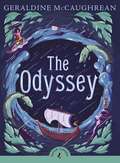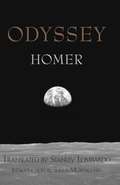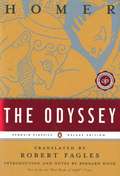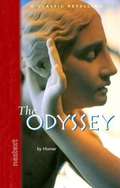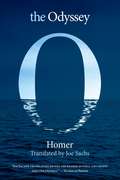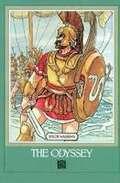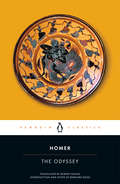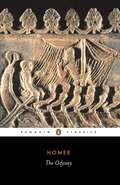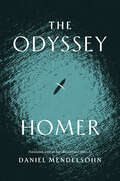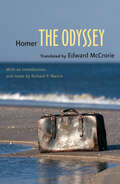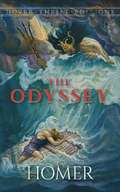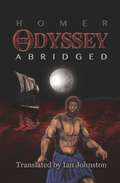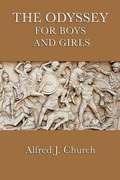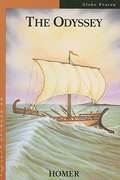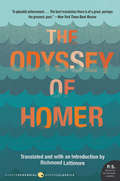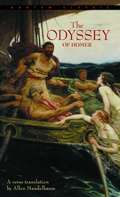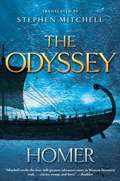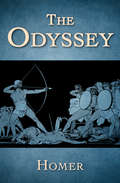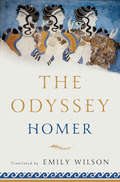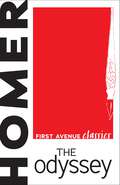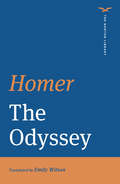- Table View
- List View
The Odyssey
by Homer Geraldine MccaughreanThis book describes the epic journey of Odysseus, the hero of Ancient Greece...After ten years of war, Odysseus turns his back on Troy and sets sail for home. But his voyage takes another ten years and he must face many dangers - Polyphemus the greedy one-eyed giant, Scylla the six-headed sea monster and even the wrath of the gods themselves - before he is reunited with his wife and son.
The Odyssey
by Samuel Butler HomerClassic poem by Homer, translated by Samuel Butler [This text is listed as an example that meets Common Core Standards in English language arts in grades 9-10 at http://www.corestandards.org.]
The Odyssey
by Homer Robert FitzgeraldWinner of the 1961 Bollingen Award for the best translation of a poem into English, Homer's epic poem shines through this perceptive translation. [This text is listed as an example that meets Common Core Standards in English language arts in grades 9-10 at http://www.corestandards.org.]
The Odyssey
by Homer Stanley LombardoLombardo's Odyssey offers the distinctive speed, clarity, and boldness that so distinguished his 1997 Iliad. Lombardo has created a Homeric voice for his contemporaries: fresh, quick and verbally engaging to the modern ear, as the original was to the ancient. His characters come alive as real people expressing real feelings with urgency and verve. This would be very welcome for classroom use. [This text is listed as an example that meets Common Core Standards in English language arts in grades 9-10 at http://www.corestandards.org.]
The Odyssey
by Homer<P>Robert Fagles, winner of the PEN/Ralph Manheim Medal for Translation and a 1996 Academy Award in Literature from the American Academy of Arts and Letters presents us with Homer's best-loved and most accessible poem in a stunning new modern-verse translation. <P>"Sing to me of the man, Muse, the man of twists and turns driven time and again off course, once he had plundered the hallowed heights of Troy." <P> So begins Robert Fagles' magnificent translation of the Odyssey, which Jasper Griffin in The New York Times Review of Books hails as "a distinguished achievement." <P> If the Iliad is the world's greatest war epic, the Odyssey is literature's grandest evocation of everyman's journey through life. Odysseus' reliance on his wit and wiliness for survival in his encounters with divine and natural forces, during his ten-year voyage home to Ithaca after the Trojan War, is at once the timeless human story and an individual test of moral endurance. <P> In the myths and legends that are retold here, Fagles has captured the energy and poetry of Homer's original in a bold, contemporary idiom, and given us an Odyssey to read aloud, to savor, and to treasure for its sheer lyrical mastery. <P> Renowned classicist Bernard Knox's superb Introduction and textual commentary provide new insights and background information for the general reader and scholar alike, intensifying the strength of Fagles' translation. <P> This is an Odyssey to delight both the classicist and the public at large, and to captivate a new generation of Homer's students. <P>[This text is listed as an example that meets Common Core Standards in English language arts in grades 6-8 at http://www.corestandards.org.] .
The Odyssey
by Homer McDougal Littell Publishers Staff"The Iliad is the story about the last four days of the Trojan War. The war began after a young man named Paris stole Helen of Troy from her husband, Menelaus. The Greeks promised to help Menelaus fight for Helen, and they sent a thousand ships with him to Troy, including a ship with Odysseus on board. But the city of Troy was well defended, and the battle went on for ten years. Odysseus helped decide the war when he tricked the Trojans. He and his men built a huge wooden horse. Greek soldiers were hidden inside the horse, which was left outside the gate of the city of Troy as a gift. Once the horse was pulled inside the walls of Troy, the Greeks were at last able to enter the city and help win the battle. The Odyssey tells the story of Odysseus, who had left Troy after the war with twelve ships and more than 700 men. Yet only Odysseus returned home to Ithaca after many adventures and much sorrow. "
The Odyssey
by HomerJourney with Ulysses as he battles to bring his victorious, but decimated, troops home from the Trojan War, dogged by the wrath of the god Poseidon at every turn. Having been away for twenty years, little does he know what awaits him when he finally makes his way home.
The Odyssey
by HomerWe believe this work is culturally important, we have made it available as part of our commitment for protecting, preserving, and promoting the world's literature in affordable, high quality, modern editions that are true to the original work.
The Odyssey
by HomerRetells in simple language five episodes in the voyage of the Greek hero Odysseus from Troy to his home in Ithaca.
The Odyssey
by HomerRobert Fagles, winner of the PEN/Ralph Manheim Medal for Translation and a 1996 Academy Award in Literature from the American Academy of Arts and Letters presents us with Homer's best-loved and most accessible poem in a stunning new modern-verse translation. "Sing to me of the man, Muse, the man of twists and turns driven time and again off course, once he had plundered the hallowed heights of Troy. " So begins Robert Fagles' magnificent translation of the Odyssey, which Jasper Griffin in The New York Times Review of Books hails as "a distinguished achievement. " If the Iliad is the world's greatest war epic, the Odyssey is literature's grandest evocation of everyman's journey through life. Odysseus' reliance on his wit and wiliness for survival in his encounters with divine and natural forces, during his ten-year voyage home to Ithaca after the Trojan War, is at once the timeless human story and an individual test of moral endurance. In the myths and legends that are retold here, Fagles has captured the energy and poetry of Homer's original in a bold, contemporary idiom, and given us an Odyssey to read aloud, to savor, and to treasure for its sheer lyrical mastery. Renowned classicist Bernard Knox's superb Introduction and textual commentary provide new insights and background information for the general reader and scholar alike, intensifying the strength of Fagles' translation. This is an Odyssey to delight both the classicist and the public at large, and to captivate a new generation of Homer's students. @IthacaStateOfMind Uh oh. This cave is a giant's lair. He has a taste for cheese, and my companions. He also has only one eye. Trying to keep from laughing. Got him drunk. Put a hot poker in his ONE EYE when he blacked out. That will show him - if he could see. LOL. Time to leave. Damn. Poseidon pissed. How was I supposed to know One-Eye was his son? What Olympian whore did he sleep with to get an issue like that? From Twitterature: The World's Greatest Books in Twenty Tweets or Less .
The Odyssey
by Homer'The Odyssey is a poem of extraordinary pleasures: it is a salt-caked, storm-tossed, wine-dark treasury of tales, of many twists and turns, like life itself' GuardianThe epic tale of Odysseus and his ten-year journey home after the Trojan War forms one of the earliest and greatest works of Western literature. Confronted by natural and supernatural threats - ship-wrecks, battles, monsters and the implacable enmity of the sea-god Poseidon - Odysseus must use his bravery and cunning to reach his homeland and overcome the obstacles that, even there, await him. E. V. Rieu's translation of The Odyssey was the very first Penguin Classic to be published, and has itself achieved classic status. Translated by E. V. RIEU Revised translation by D. C. H. RIEU With an Introduction by PETER JONES
The Odyssey
by Homer“This may be the best translation of The Odyssey yet."—Edith Hall, The Telegraph A magnificent feat of translation, hailed by classicists and poets alike as a “momentous achievement”: “thrilling,” “rich and rhythmical,” “superb,” “mesmerizing,” “searingly faithful—yet absolutely original.” With this edition of Homer’s Odyssey, the celebrated author, critic, and classicist Daniel Mendelsohn brings the great epic to vividly poetic new life. Widely known for his essays on classical literature and culture in The New Yorker and many other publications, Mendelsohn gives us a line-for-line rendering of The Odyssey that is both engrossing as poetry and true to its source. Rejecting the streamlining and modernizing approach of many recent translations, he artfully reproduces the epic’s formal qualities—meter, enjambment, alliteration, assonance—and in so doing restores to Homer’s masterwork its archaic grandeur. Mendelsohn’s expansive six-beat line, far closer to the original than that of other recent translations, allows him to capture each of Homer’s dense verses without sacrificing the amplitude and shadings of the original. The result is the richest, most ample, most precise, and most musical Odyssey in English, conveying the beauty of its poetry, the excitement of its hero’s adventures, and the profundity of its insights. Supported by an extensive introduction and the fullest notes and commentary currently available, Daniel Mendelsohn’s Odyssey is poised to become the authoritative version of this magnificent and enduringly influential masterpiece.
The Odyssey (Johns Hopkins New Translations from Antiquity)
by HomerA bold new translation that preserves the swiftness, austerity, and clarity of the original."Tell us, Goddess, daughter of Zeus, start in your own place:when all the rest at Troy had fled from that steep doomand gone back home, away from war and the salt sea,only this man longed for his wife and a way home."Homer's Odyssey, at once an exciting epic of strife and subterfuge and a deeply felt tale of love and devotion, stands at the very beginning of the Western literary tradition. From ancient Greece to the present day its influence on later literature has been unsurpassed, and for centuries translators have approached the meter, tone, and pace of Homer's poetry with a variety of strategies. Chapman and Pope paid keen attention to color, drama, and vivacity of style, rendering the Greek verse loosely and inventively. In the twentieth century, translators such as Lattimore kept rigorously close to the sense of each word in the original; others, including Fitzgerald and Fagles, have departed further from the language of the original, employing their own inventive modern style.Poet and translator Edward McCrorie now opens new territory in this striking rendition, which captures the spare, powerful tone of Homer's epic while engaging contemporary readers with its brisk pace, idiomatic language, and lively characterization. McCrorie closely reproduces the Greek metrical patterns and employs a diction and syntax that reflects the plain, at times stark, quality of Homer's lines, rather than later English poetic styles. Avoiding both the stiffness of word-for-word literalism and the exaggeration and distortion of free adaptation, this translation dramatically evokes the ancient sound and sense of the poem. McCrorie's is truly an Odyssey for the twenty-first century.To accompany this innovative translation, noted classical scholar Richard Martin has written an accessible and wide-ranging introduction explaining the historical and literary context of the Odyssey, its theological and cultural underpinnings, Homer's poetic strategies and narrative techniques, and his cast of characters. In addition, Martin provides detailed notes—far more extensive than those in other editions—addressing key themes and concepts; the histories of persons, gods, events, and myths; literary motifs and devices; and plot development. Also included is a pronunciation glossary and character index.
The Odyssey (Unabridged)
by HomerThis prose translation of Homer's epic poem of the 9th century BC recounts one of Western civilization's most glorious tales, a treasury of Greek folklore and myth that maintains an ageless appeal for modern readers. Translated by George Herbert Palmer.
The Odyssey Abridged (Third Edition)
by Homer Ian JohnstonThis abridged text of Homer's Odyssey has been prepared by Ian Johnston from his translation of the full text which is about one third the length of the original.
The Odyssey for Boys and Girls
by Alfred J. ChurchThe Odyssey is literature's grandest evocation of every man's journey though life. The poem centers on the Greek hero Odysseus and his long journey home after the fall of Troy. It takes Odysseus ten years to reach Ithaca after the ten-year Trojan War. Odysseus survives storm and shipwreck, the cave of the Cyclops and the isle of Circe, the lure of the Sirens' song, and a trip to the Underworld, only to find his most difficult challenge at home, where treacherous suitors seek to steal his kingdom and his loyal wife, Penelope. The Odyssey is Homers' sequel to the Iliad.
The Odyssey of Homer ( An Adapted Classic)
by Homer Henry I. ChristHomer's great epic describes the many adventures of Odysseus, Greek warrior, as he strives over many years to return to his home island of Ithaca after the Trojan War. His colorful adventures, his endurance, his love for his wife and son have the same power to move and inspire readers today as they did in Archaic Greece, 2800 years ago.
The Odyssey of Homer (Harper Perennial Modern Thought Ser.)
by Homer Richmond LattimoreThe most eloquent translation of Homer's Odyssey into modern English. [This text is listed as an example that meets Common Core Standards in English language arts in grades 9-10 at http://www.corestandards.org.]
The Odyssey of Homer: According To The Text Of Wolf; With Notes, For The Use Of Schools And Colleges (classic Reprint)
by HomerHomer's epic chronicle of the Greek hero Odysseus' journey home from the Trojan War has inspired writers from Virgil to James Joyce. Odysseus survives storm and shipwreck, the cave of the Cyclops and the isle of Circe, the lure of the Sirens' song and a trip to the Underworld, only to find his most difficult challenge at home, where treacherous suitors seek to steal his kingdom and his loyal wife, Penelope. Favorite of the gods, Odysseus embodies the energy, intellect, and resourcefulness that were of highest value to the ancients and that remain ideals in out time.In this new verse translation, Allen Mandelbaum--celebrated poet and translator of Virgil's Aeneid and Dante's Divine Comedy --realizes the power and beauty of the original Greek verse and demonstrates why the epic tale of The Odyssey has captured the human imagination for nearly three thousand years.From the Paperback edition. [This text is listed as an example that meets Common Core Standards in English language arts in grades 9-10 at http://www.corestandards.org.]
The Odyssey: (The Stephen Mitchell Translation)
by Homer Stephen MitchellFrom Stephen Mitchell, the renowned translator whose Iliad was named one of The New Yorker’s Favorite Books of 2011, comes a vivid new translation of the Odyssey, complete with textual notes and an illuminating introductory essay.The hardcover publication of the Odyssey received glowing reviews: The New York Times praised “Mitchell’s fresh, elegant diction and the care he lavishes on meter, [which] brought me closer to the transfigurative experience Keats describes on reading Chapman’s Homer”; Booklist, in a starred review, said that “Mitchell retells the first, still greatest adventure story in Western literature with clarity, sweep, and force”; and John Banville, author of The Sea, called this translation “a masterpiece.” The Odyssey is the original hero’s journey, an epic voyage into the unknown, and has inspired other creative work for millennia. With its consummately modern hero, full of guile and wit, always prepared to reinvent himself in order to realize his heart’s desire—to return to his home and family after ten years of war—the Odyssey now speaks to us again across 2,600 years. In words of great poetic power, this translation brings Odysseus and his adventures to life as never before. Stephen Mitchell’s language keeps the diction close to spoken English, yet its rhythms recreate the oceanic surge of the ancient Greek. Full of imagination and light, beauty and humor, this Odyssey carries you along in a fast stream of action and imagery. Just as Mitchell “re-energised the Iliad for a new generation” (The Sunday Telegraph), his Odyssey is the noblest, clearest, and most captivating rendition of one of the defining masterpieces of Western literature.
The Odyssey: 1
by HomerThe Ancient Greek tale of Odysseus, cursed to wander the perilous world on his epic voyage home. The decade-long Trojan War has come to an end and Odysseus, the King of Ithaca instrumental in securing victory for the Greeks, finally sets sail for home. But his adventures are far from over. Cursed by the god Poseidon to wander the earth for ten years, he must battle monstrous creatures—even facing the land of the dead—before returning to Ithaca, where still more dangers await him. In his long absence, Odysseus&’s wife, Penelope, and son, Telemachus, have endured a violent crowd of suitors who occupied the royal palace. Together with The Iliad, Homer&’s epic poem of the Trojan War, The Odyssey is one of the oldest surviving works of Western literature. Samuel Butler&’s beautiful English prose version, first appearing in 1900, remains one of the most beloved and acclaimed translations of this timeless tale. This ebook has been professionally proofread to ensure accuracy and readability on all devices.
The Odyssey: 1
by HomerA New York Times Notable Book of 2018 "Wilson’s language is fresh, unpretentious and lean…It is rare to find a translation that is at once so effortlessly easy to read and so rigorously considered." —Madeline Miller, author of Circe Composed at the rosy-fingered dawn of world literature almost three millennia ago, The Odyssey is a poem about violence and the aftermath of war; about wealth, poverty and power; about marriage and family; about travelers, hospitality, and the yearning for home. This fresh, authoritative translation captures the beauty of this ancient poem as well as the drama of its narrative. Its characters are unforgettable, none more so than the “complicated” hero himself, a man of many disguises, many tricks, and many moods, who emerges in this version as a more fully rounded human being than ever before. Written in iambic pentameter verse and a vivid, contemporary idiom, Emily Wilson’s Odyssey sings with a voice that echoes Homer’s music; matching the number of lines in the Greek original, the poem sails along at Homer’s swift, smooth pace. A fascinating, informative introduction explores the Bronze Age milieu that produced the epic, the poem’s major themes, the controversies about its origins, and the unparalleled scope of its impact and influence. Maps drawn especially for this volume, a pronunciation glossary, and extensive notes and summaries of each book make this is an Odyssey that will be treasured by a new generation of readers.
The Odyssey: 1 (First Avenue Classics ™)
by HomerOdysseus, the hero of the Trojan War, longs to return home to his kingdom in Ithaca, where a horde of suitors (who believe the long-absent Odysseus to be dead) are courting his beloved wife. Odysseus had angered the sea god, Poseidon, and for the past ten years, he's been beset by a host of challenges. The Greek hero must rely on wit, strength, and the aid of the gods of Mount Olympus to survive tumultuous storms, battles with great beasts, and the seductive powers of witches, sirens, and nymphs as he makes his way homeward. Originally written around 700 BCE, the authorship of this epic poem remains uncertain, but most scholars ascribe it to a blind Greek poet named Homer. This unabridged translation by William Cowper was originally published in 1791.
The Odyssey: 1 (The Norton Library #0)
by HomerAbout Emily Wilson’s translation “Wilson’s language is fresh, unpretentious, and lean. Even knowing the text well, I found myself rapt. Her worthy goal is always to engage readers, inviting them more deeply into the story. In this she succeeds with the skill of an ancient bard.” —MADELINE MILLER, author of Circe
The Odyssey: A Dramatic Retelling of Homer's Epic
by Simon ArmitageIn this new verse adaptation, originally commissioned for BBC radio, Simon Armitage has recast Homer's epic as a series of bristling dramatic dialogues: between gods and men; between no-nonsense Captain Odysseus and his unruly, lotus-eating, homesick companions; and between subtle Odysseus (wiliest hero of antiquity) and a range of shape-shifting adversaries―Calypso, Circe, the Sirens, the Cyclops―as he and his men are "pinballed between islands" of adversity. One of the most individual voices of his generation, Armitage revitalizes our sense of the Odyssey as oral poetry, as indeed one of the greatest of tall tales.
